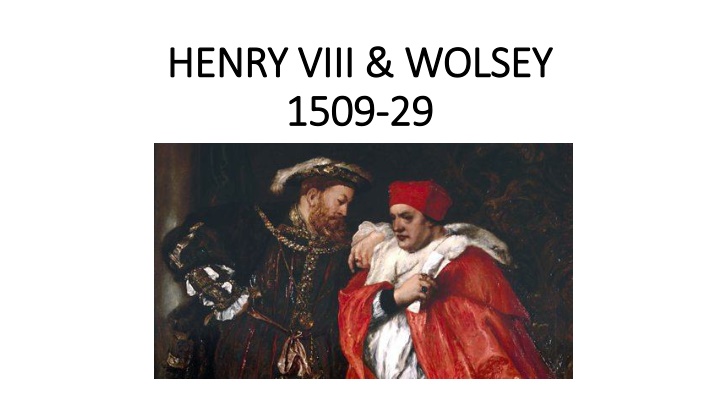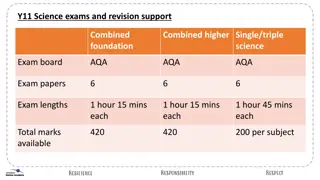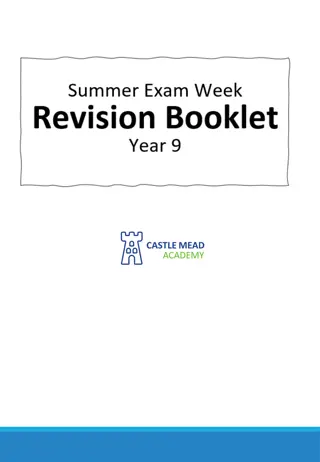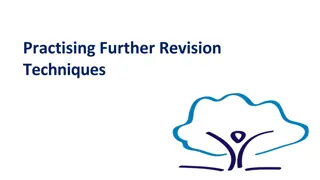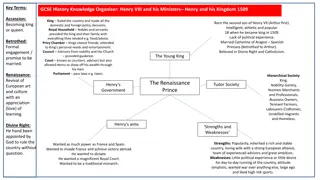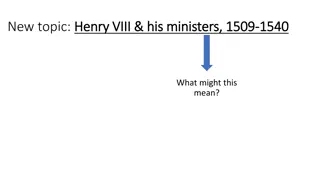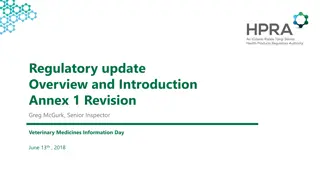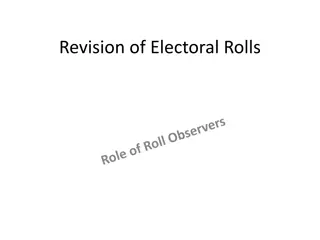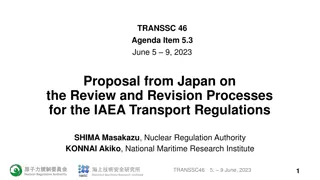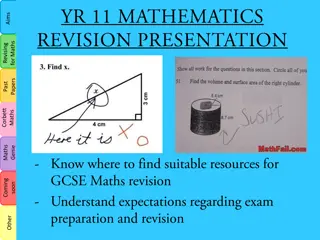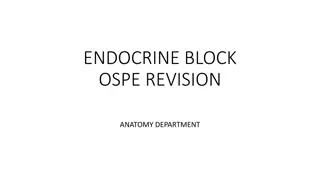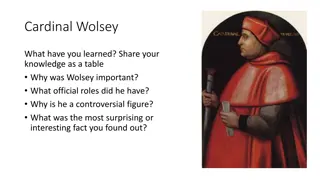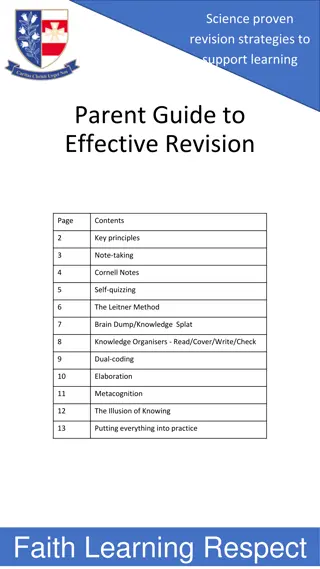Henry VIII & Wolsey 1509-1529
Henry VIII's reign from 1509 to 1529 saw mixed success in domestic policy and notable achievements in foreign affairs. The king displayed a distinct rule compared to his father, executing key figures while implementing beneficial initiatives like the subsidy. However, his marital issues and failed policies posed challenges. Cardinal Wolsey rose to power through his abilities, shaping Henry's policies and aiding in diplomatic successes. Despite setbacks, Henry attained victories in foreign relations, showcasing his Renaissance aspirations.
Download Presentation

Please find below an Image/Link to download the presentation.
The content on the website is provided AS IS for your information and personal use only. It may not be sold, licensed, or shared on other websites without obtaining consent from the author.If you encounter any issues during the download, it is possible that the publisher has removed the file from their server.
You are allowed to download the files provided on this website for personal or commercial use, subject to the condition that they are used lawfully. All files are the property of their respective owners.
The content on the website is provided AS IS for your information and personal use only. It may not be sold, licensed, or shared on other websites without obtaining consent from the author.
E N D
Presentation Transcript
HENRY VIII & WOLSEY HENRY VIII & WOLSEY 1509 1509- -29 29
HOW SUCCESSFUL WAS HS DOMESTIC HOW SUCCESSFUL WAS H S DOMESTIC POLICY 1509 POLICY 1509- -29? 29? SUCCESSES FAILURES H showed that he was a very different king to his father through the execution of Empson and Dudley. His anti-French foreign policy & generosity with patronage (e.g. the creation of the Dukes of Norfolk & Suffolk) won the allegiance of the nobility while at the same time the executions of Suffolk in 1513 & Buckingham in 1521 showed that he would not tolerate threats to his throne. The introduction of the subsidy in 1513 was a significant boost to royal revenue. H quickly wasted the surplus his father had so carefully accumulated. The Amicable Grant in 1525 provoked so much opposition that it had to be abandoned. H s marriage was a failure, endangering the succession: Catherine produced only a daughter & H s only son was illegitimate.
EXAM QUESTIONS ON HENRY EXAM QUESTIONS ON HENRY VIII & WOLSEY 1509 VIII & WOLSEY 1509- -29 29 1. How successful was Henry VIII in achieving his aims as king 1509-29? 2. Assess the reasons for Wolsey s rise to power. 3. How successful / beneficial for England was H VIII s foreign policy in the period 1509-29? 4. Reasons for Wolsey s fall, including failure to get the annulment & lack of noble support 5. AS EXAM 2016: How successful was Wolsey s domestic policy?
REASONS FOR WOLSEYS RIS REASONS FOR WOLSEY S RISE W rose despite his humble background through sheer ability, both intellectual & administrative, & an extraordinary capacity for hard work. For a poor boy with his academic ability the Church offered a valuable career ladder. Unlike his father H was bored by detailed financial & administrative work & was happy for W to take care of this for him, especially as W had the tact & charm to ensure that any discussion of govt. business was as short & agreeable as possible. W s appointment as Almoner at the start of H VIII s reign gave him a seat on the Royal Council. Recognising what H wanted, W argued in favour of war with France agt. more cautious councillors like Warham & Fox who advocated the continuation of H VII s peace policy. This led to W replacing Warham as L Chancellor in 1515. The introduction of the subsidy in 1513 significantly boosted tax revenue & made it possible for H to win military glory in France. W s diplomatic skill enabled H to pose as the peacemaker of Europe in the Treaty of London in 1518 & to consider offers from both Francis I & Charles V to ally with him 1520-1 before getting an alliance with C in 1521.
FOREIGN POLICY SUCCESSES FOREIGN POLICY SUCCESSES 1509 1509- -29 Henry did make his mark on Europe and the defeat of the French at the Battle of the Spurs did give him glory & led to the capture of Tournai & Th rouanne. This was a victory for his policy of allying with Maximilian against France. H forced the French king Louis XII to pay him a pension & marry his sister Mary in 1514. H achieved a decisive victory at Flodden in 1513; James IV was killed, H s sister Margaret became Regent of Scotland & there was no further threat from Scotland until the 1540s. H showed his desire to be a seen as a Renaissance king by favouring Erasmus & posing as the peacemaker of Europe in the Treaty of London in 1518. H secured the appointment of Wolsey as a cardinal in 1518. Henry also achieved his glory through the peace conferences that Wolsey organised, especially the Field of the Cloth of Gold in 1520. H enjoyed being able to choose whether to ally with Francis I or Charles V 1520-1. 29
FOREIGN POLICY SUCCESSES? FOREIGN POLICY SUCCESSES? Tournai & Therouanne captured 1513 BUT they had to be sold back only 5 years later for much less than it cost to capture & fortify them The Treaty of London 1518 was a diplomatic triumph for Wolsey BUT it had broken down by 1521, when war broke out between FI & CV In 1520 FI & CV competed for H s alliance & H secured an alliance with C 1521 BUT the 1523 invasion of France failed & C rejected H s proposal for a partition of France 1525, forcing H to ally with France FI promised to help secure papal consent for the annulment by expelling C from Italy following his capture of Rome 1527 BUT F suffered a decisive defeat 1529 & made treaty with CV H aspired to be a major European power on a par with France & CV s empire BUT England lacked the resources to do so: H only had 10% of F s annual revenue (C s was even greater) & had to make peace 1514, 1518 & 1525 b/c H couldn t afford war H had to rely on FI to do his fighting for him 1527-9 b/c England had no power in Italy & couldn t even afford to ban trade with Flanders
FOREIGN POLICY FAILURES 1509 FOREIGN POLICY FAILURES 1509- -21 21 H s aim to repeat the glories of Edward III & Henry V were not achieved; he never achieved any significant or lasting gains in France despite spending vast sums of money. The refusal to pay the Amicable Grant showed his subjects recognised this. He was let down by Ferdinand in 1512, leading to the failure of his invasion of France that year. The glory he got from the Battle of the Spurs was exaggerated & Tournai & Th rouanne had to be sold back after only 5 years for much less than it cost to capture & fortify them. Maximilian let H down despite the money he gave him. Louis XII s marriage to Mary was shortlived & by allowing her to marry Suffolk H missed a chance to secure another diplomatically advantageous marriage. The most significant English victory in H s reign was at Flodden in 1513 & he wasn t even there. Peace was not H s preferred policy so whatever prestige he got from the peace conferences Wolsey organised was limited. Neither the Treaty of London nor the Field of the Cloth of Gold produced any lasting results.
FOREIGN POLICY FAILURES 1521 FOREIGN POLICY FAILURES 1521- -9 9 His invasions of France 1522-3 were failures: C V was unimpressed & deserted H, so he got no compensation for the French pension he had lost & the proposed marriage between C V & H s daughter Mary never took place. H was unable to take advantage of the French defeat at Pavia b/c of the failure of the Amicable Grant & C s lack of interest in supporting him, forcing H to sign a treaty with France. In fact Charles s victory at Pavia lessened Henry s influence and also led to the final failure over his annulment. The appointment of Wolsey as Cardinal had little effect & H never succeeded in securing his election as Pope, which showed his lack of influence in Europe & contributed to his failure to obtain the annulment. All H s efforts to secure papal consent for the annulment failed, both in terms of theological arguments & diplomatic efforts; the Treaty of Cambrai between F & C & the collapse of the legatine court, both in 1529, sealed his failure & the dismissal of Wolsey in the same year showed H recognised this. The Treaty of Cambrai showed how isolated & lacking in influence England truly was at the end of this period.
WOLSEYS DOMESTIC POLICY SUCCESSES WOLSEY S DOMESTIC POLICY SUCCESSES H obviously regarded him as a success b/c he gave him so much wealth & power (including promotion to Bishop of Winchester, Archbishop of York & Lord Chancellor with an annual income of 35,000) & kept him as chief minister for 14 years (1515- 29); no one else ever achieved this. Peter Gwyn argues that he had a good relationship with the nobility, pointing out that many of them sent their sons to be brought up in his household & that Norfolk & Suffolk sometimes asked him to arbitrate in disputes between them. The nobility only professed hostility towards him after he lost the King s favour over the annulment. As Lord Chancellor Wolsey improved the legal system, increasing the number of cases heard in Star Chamber, Chancery & Requests & therefore the availability of justice for all. Wolsey s policy towards enclosures & engrossing showed a genuine desire to help the poor. The subsidy led to a significant increase in tax revenue, enabling H to win a prestigious victory in France. His policy of dissolving small, unviable monasteries to fund his college at Oxford & school at Ipswich showed his commitment to education & church reform.
FAILURES FAILURES His power & wealth (coupled with his lowly social origins) inevitably attracted the jealousy of the nobility, especially as he tried to restrict the influence of the younger nobles through the Eltham Ordinances. This contributed to his downfall. The Amicable Grant provoked so much resistance that it had to be abandoned & Wolsey was blamed for its failure, which meant H missed the opportunity to exploit C V s victory at Pavia. In general W could not raise enough money to enable H to win any significant victories in France. W s policy towards enclosure achieved no lasting success & had to be abandoned b/c of lack of money. Similarly, the courts could not cope with the increase in their caseload which his policies helped to generate. W s dissolution of a few small monasteries to fund his pet education projects was on too small a scale & arguably just an ego trip , missing an opportunity for much more fundamental reform. As a wealthy absentee pluralist who exploited the Church for financial & political gain, W exemplified everything which was wrong with the pre-Reformation Church. In fact the abuses he practised & his failure to secure the annulment discredited the Church in the eyes of H & the nobility & caused the attacks on it from 1529 onwards. His failure to secure the annulment resulted in him being seen as a failure by everyone (H, the nobility & both the Aragon & Boleyn factions) & led to his rapid fall from power.
WHY WAS WOLSEY UNPOPULAR? WHY WAS WOLSEY UNPOPULAR? Supporters of Anne Boleyn were hostile to Wolsey because of his failure to secure the annulment and the fact that he was competing with Anne for the king s attention. Supporters of Catherine of Aragon were hostile because he had tried to secure the annulment. Wolsey quarrelled with Henry over the foundation of his school in Ipswich & with Anne over who should be Abbess of Wilton. He also failed to gain support of the nobles, partly because he had introduced many policies that were very harsh against the nobles so many resented him and also because he had worked his way up from lowly origins so he was viewed by the nobles to have stolen their power from them. They resented his attempt to exclude them from power through the Eltham Ordinances in 1526. Wolsey was hated for the high taxes he imposed, especially the Amicable Grant. As a wealthy & corrupt churchman he attracted anticlerical resentment. In the House of Commons, gentry hated his prosecution of enclosures & common lawyers resented his encouragement of civil as opposed to common law which threatened their business.
WHY WAS THE ANNULMENT THE MAIN REASON WHY WAS THE ANNULMENT THE MAIN REASON FOR WOLSEY S DOWNFALL? FOR WOLSEY S DOWNFALL? This became Henry s main aim, as it would enable him to get a male heir and create a dynasty as well as the fact that he had fallen in love with Anne Boleyn. After the Sack of Rome in 1527, The Pope was under the control of Charles, who was Catherine of Aragon s nephew. For this reason, he would not allow the annulment to happen, as it would make his cousin illegitimate and dishonour his family name. As a Cardinal and a Papal Legate Wolsey was responsible for securing the annulment because it was a church matter & he had connections with the Pope. The first way that Wolsey tried to secure the annulment was through the Anglo-French alliance, because Francis was the only person that had the necessary resources to take on Charles. However the Treaty of Cambrai was agreed in 1529 between Francis and Charles which ended any prospect of France being able to free the Pope from Charles s control. Then Wolsey tried to use the legatine court by trying to persuade the Pope to let him preside over it in England. The Pope agreed to it being held in England, however he sent Campeggio to preside over it as well, and Campeggio would look out for the Pope s own interests, just as Wolsey was looking out for Henry s. This meant that the annulment would never happen as they would never be able to agree on anything. The failure to secure the annulment meant the king lost patience with him, it was the final straw for Henry which meant that Wolsey s downfall was inevitable. Before 1529, most nobles (e.g. the Dukes of Norfolk & Suffolk) co-operated with Wolsey; it was only after he lost Henry s favour because of his failure to secure the annulment that everyone turned against him.
KEY POINTS KEY POINTS Wolsey was, in Peter Gwyn s phrase, the King s Cardinal, not the Pope s; his rise depended on the King s favour & he fell from power when he lost it; Wolsey is supposed to have said on his deathbed, if I had served God as well as I have served the King, He would not have given me over in my grey hairs Foreign policy had to be his priority b/c it was the King s B/c of this, the most important domestic policy (& the one to which he devoted most time) was raising the finance to pay for H s wars The annulment is massively important in any essay about either domestic (the legatine court) or foreign (the French alliance) policy; it was also by far the most important reason for W s downfall H s failure to have a son was by far his most important failure 1509-29 & this explains why he was so desperate to annul his marriage.
REMEMBER: REMEMBER: FAILING TO FAILING TO MENTION THE MENTION THE ANNULMENT IN ANNULMENT IN ANY ESSAY ABOUT ANY ESSAY ABOUT EITHER DOMESTIC EITHER DOMESTIC OR FOREIGN OR FOREIGN POLICY IS A POLICY IS A HANGING HANGING OFFENCE OFFENCE
